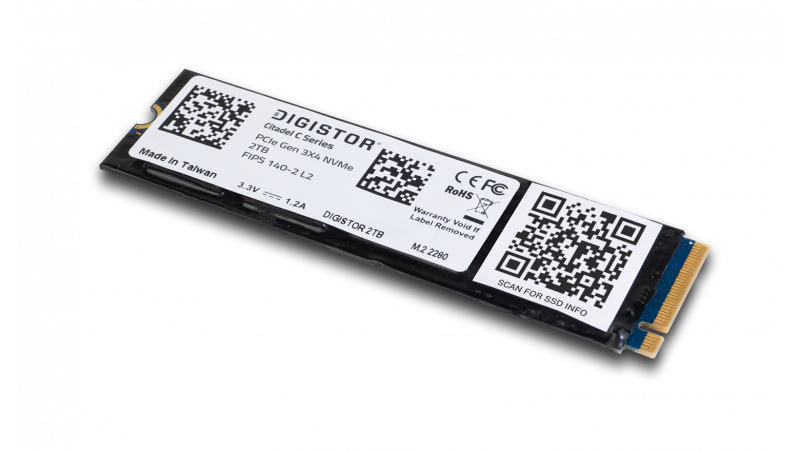Citadel™ C Series:
Security Made Easy
CSfC- and NIAP-listed protection against unauthorized access to laptops, desktops, and servers

Fortify Your Security with Pre-Boot Authentication
With Citadel C Series’ pre-boot authentication (PBA), a user must provide trusted credentials to the SSD itself before the computer can detect the presence of the SSD, let alone boot up. This prevents unauthorized users from gaining access to the encrypted drive and its data–even if the SSD is removed.
Securing Data at Rest (DAR) in a zero-trust architecture prevents cyberattacks and keeps information safe. Use Citadel C Series self-encrypting drives (SEDs)—powered by Cigent®—to protect sensitive data in laptops, desktops, and other endpoint devices.
Key features include
Hardware is more secure than software
The PBA cannot be disabled by users or malware from within an operating system
Meet rigorous security standards
FIPS versions are validated by NIST and meet requirements for CSfC and NIAP Common Criteria
Access data at full speed, unlike Bitlocker
Bitlocker can rob up to 45 percent of your SSD’s speed as it forces the CPU to encrypt and decrypt everything
Adversaries can't steal what they can't see
Attackers can’t remove data from stolen devices or access it without proper credentials
Invisible data
Complete disk encryption protected by non-recoverable key
Additional Citadel C Series Features
Citadel C-PBA (PBA Only)
- Pre-boot authentication: Prevent unauthorized access to sensitive data and applications
- Multifactor authentication (MFA): Requires more than one authentication for access. Multiple authentication methods include password, CAC/PIV, smartcard, and PIV-supported Yubikey
- Achieve government mandates: All Citadel C Series C-PBA SSDs are CSfC and NIAP-listed, FIPS validated
- A complete CSfC layer: Constitutes a complete CSfC layer in a two-layer solution
- Address critical requirements for data governance and privacy programs: CMMC, HIPAA, GDPR, GLBA, PCI-DSS, and CCPA
- TAA compliance: Meets regulatory requirements and maintains data security
Citadel C-SEL (Select)
Includes all the features of Citadel C-PBA, plus:
- Real-time protection from physical and remote attacks: Prevent data theft from lack of proper IT hygiene, stolen devices, and ransomware
- Prevent unauthorized file access with additional authentication: Consistently defeats zero-day ransomware and data theft for in-use data. Files can be configured to always require authentication or as risk-based, only requiring authentication when threats are detected
- Secure online and offline file access: Access files online and offline with PIN, fingerprint, facial recognition, CAC/PIV, Duo, and authenticator apps
- FIPS validated + CSfC-listed + CC/NIAP versions available: Listed on the NSA CSfC Component List for hardware full drive encryption, as NIAP-compliant, and as FIPS validated by NIST.
- A complete CSfC layer: FIPS versions constitute a complete CSfC layer in a two-layer solution
Citadel C-ADV (Advanced)
Includes all the features of Citadel C-SEL, plus:
- Achieve government mandates: All Citadel C Series C-ADV SSDs are CSfC and NIAP-listed, FIPS validated, and constitute a complete CSfC layer in a two-layer solution
- Know who accessed data: Secure data access logs capture all insider threat activity
- Automated threat response: Self-defending firmware protects against ransomware by making data invisible if the included Cigent software service is disabled
- Retire or repurpose SSDs safely: Verified device erasure ensures every data block has truly been wiped
Citadel C Series + CRU® SHIPS Removables
- Make Citadel C Series removable with Citadel C Series SHIPS Q80 Modules
- NVMe SHIPS modules are the fastest and most robust way to transport and secure data in air-gapped environments or move large volumes of data for offloading or ingestion
- Use in any workstation, laptop, drone, device, or specialized vehicle equipped with a SHIPS receiving frame
- Learn more about SHIPS Secure High Performance Storage
Citadel C Series SED Products
Data Sheet
White Papers
Building a Citadel of Trust in a Zero Trust World
In this white paper, you’ll learn about:
- FIPS
- TCG Opal
- Pre-Boot Authentication
- Data at Rest (DAR) Best Practices
- Citadel SSDs
Is Your Data at Rest Truly Secure?
In this white paper, you’ll learn about:
- When DAR is most secure
- The difference between compliance, validation, and certification
- What your DAR checklist should look like
- Citadel SSDs
